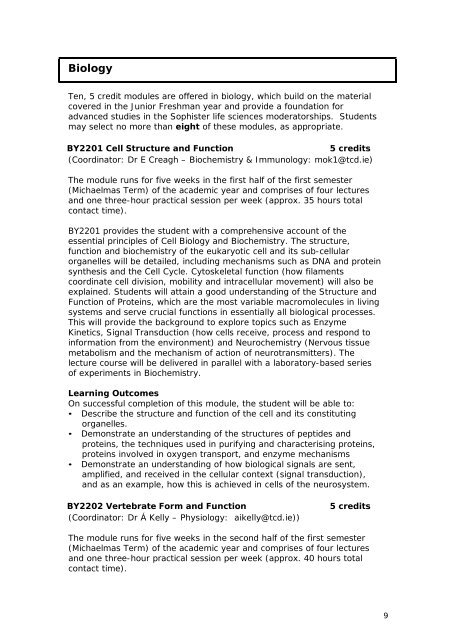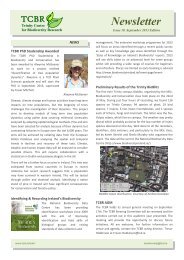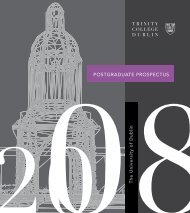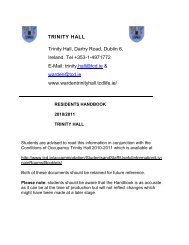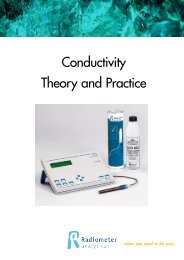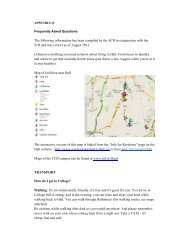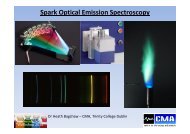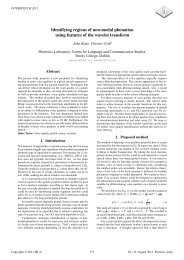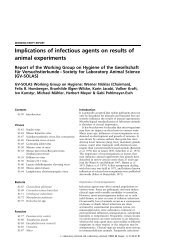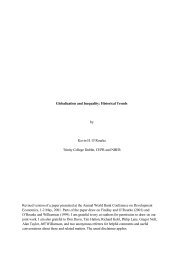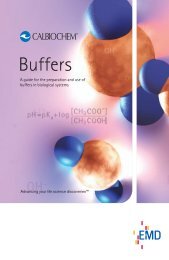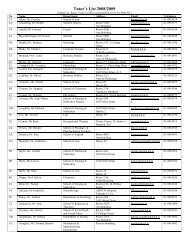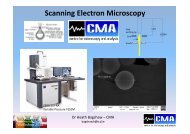Senior Freshman Programme 2013/2014 - Trinity College Dublin
Senior Freshman Programme 2013/2014 - Trinity College Dublin
Senior Freshman Programme 2013/2014 - Trinity College Dublin
Create successful ePaper yourself
Turn your PDF publications into a flip-book with our unique Google optimized e-Paper software.
Biology<br />
Ten, 5 credit modules are offered in biology, which build on the material<br />
covered in the Junior <strong>Freshman</strong> year and provide a foundation for<br />
advanced studies in the Sophister life sciences moderatorships. Students<br />
may select no more than eight of these modules, as appropriate.<br />
BY2201 Cell Structure and Function<br />
5 credits<br />
(Coordinator: Dr E Creagh – Biochemistry & Immunology: mok1@tcd.ie)<br />
The module runs for five weeks in the first half of the first semester<br />
(Michaelmas Term) of the academic year and comprises of four lectures<br />
and one three-hour practical session per week (approx. 35 hours total<br />
contact time).<br />
BY2201 provides the student with a comprehensive account of the<br />
essential principles of Cell Biology and Biochemistry. The structure,<br />
function and biochemistry of the eukaryotic cell and its sub-cellular<br />
organelles will be detailed, including mechanisms such as DNA and protein<br />
synthesis and the Cell Cycle. Cytoskeletal function (how filaments<br />
coordinate cell division, mobility and intracellular movement) will also be<br />
explained. Students will attain a good understanding of the Structure and<br />
Function of Proteins, which are the most variable macromolecules in living<br />
systems and serve crucial functions in essentially all biological processes.<br />
This will provide the background to explore topics such as Enzyme<br />
Kinetics, Signal Transduction (how cells receive, process and respond to<br />
information from the environment) and Neurochemistry (Nervous tissue<br />
metabolism and the mechanism of action of neurotransmitters). The<br />
lecture course will be delivered in parallel with a laboratory-based series<br />
of experiments in Biochemistry.<br />
Learning Outcomes<br />
On successful completion of this module, the student will be able to:<br />
• Describe the structure and function of the cell and its constituting<br />
organelles.<br />
• Demonstrate an understanding of the structures of peptides and<br />
proteins, the techniques used in purifying and characterising proteins,<br />
proteins involved in oxygen transport, and enzyme mechanisms<br />
• Demonstrate an understanding of how biological signals are sent,<br />
amplified, and received in the cellular context (signal transduction),<br />
and as an example, how this is achieved in cells of the neurosystem.<br />
BY2202 Vertebrate Form and Function<br />
(Coordinator: Dr Á Kelly – Physiology: aikelly@tcd.ie))<br />
5 credits<br />
The module runs for five weeks in the second half of the first semester<br />
(Michaelmas Term) of the academic year and comprises of four lectures<br />
and one three-hour practical session per week (approx. 40 hours total<br />
contact time).<br />
9


